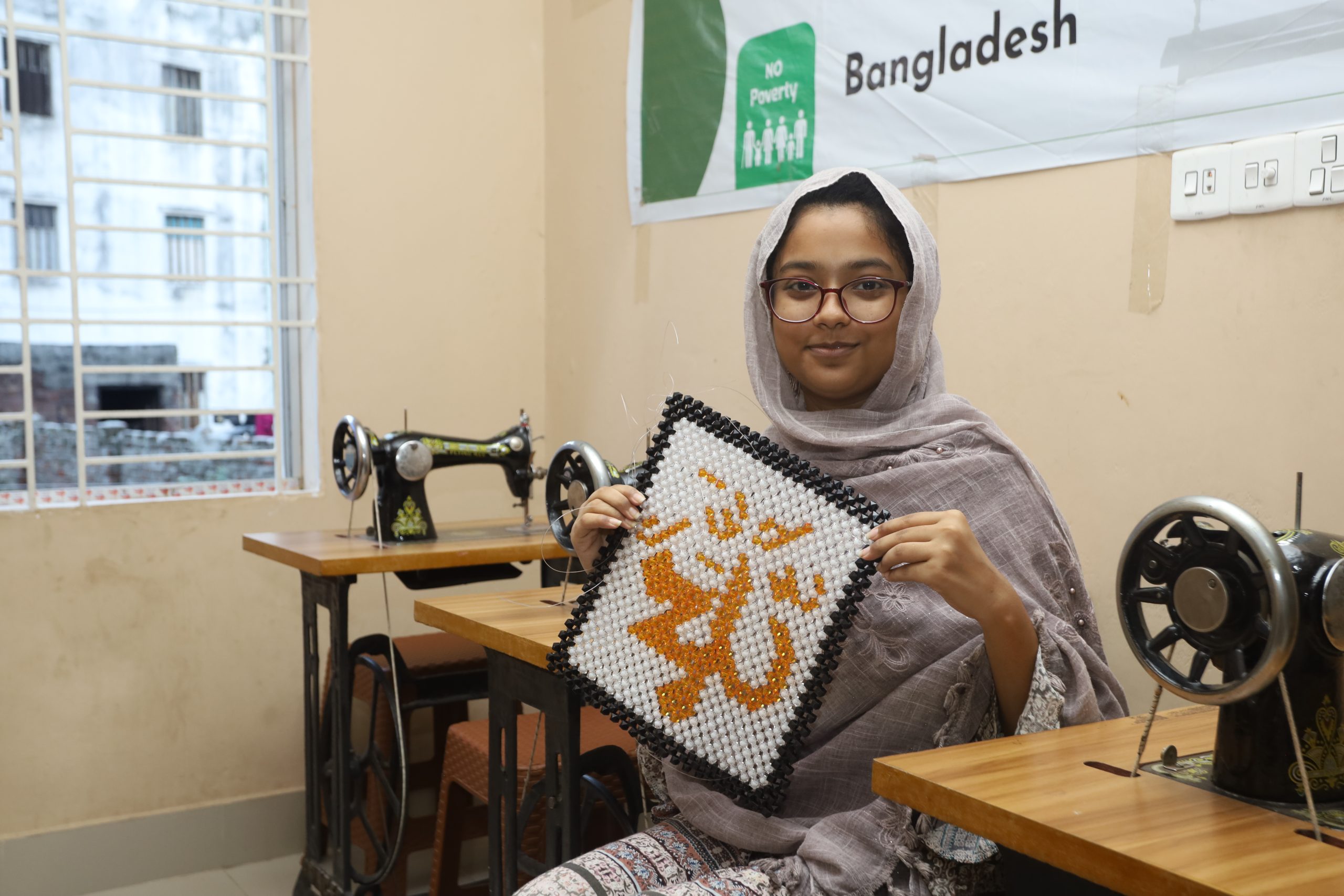Skill Development Program
Empowering Widows, Youth, and Unemployed Men and Women in Bangladesh
Background:
Bangladesh faces significant socio-economic challenges, particularly for vulnerable groups like widows, youth, and unemployed individuals. These groups often lack access to education, skills, and opportunities necessary for financial independence. Recognizing this gap, the SAWAB Foundation’s Skill Development Program was launched to empower these populations with practical skills, particularly in vocational trades and handicrafts. The program not only fosters financial stability but also preserves cultural heritage through artisanal crafts.
Program Goal:
To equip widows, youth, and unemployed individuals with market-relevant skills and resources to achieve financial independence and contribute to their communities’ socio-economic development.
Objectives:
- Provide vocational training tailored to local and global market demands.
- Promote entrepreneurship and self-reliance by teaching business and financial management skills.
- Preserve cultural heritage through handicraft training while creating income-generating opportunities.
- Foster women’s empowerment, particularly widows, by enabling financial independence.
- Ensure accessibility of skill development programs for marginalized communities.
Program Components:
- Vocational Training:
- Focus Areas: Tailoring, carpentry, electrical work, computer literacy, and other trades aligned with market needs.
- Handicraft Training:
- Artisanal Skills: Weaving, embroidery, basket-making, and pottery.
- Market Linkages: Partnering with fair-trade organizations and online platforms to ensure steady demand for crafts.
- Entrepreneurship Development:
- Workshops in business planning, financial literacy, and entrepreneurial skills.
- Targeted support for widows and youth to establish sustainable small enterprises.
- Job Placement Assistance:
- Collaborations with local businesses and industries for employment opportunities.
- Facilitating product sales at fairs, exhibitions, and online stores.
- Sustainability Support:
- Providing graduates with essential tools (e.g., sewing machines, handicraft kits) to start their businesses.
- Ongoing mentorship to help participants navigate challenges in employment or entrepreneurship.
- Accessible Community-Based Training Centers:
- Centers established in Dhaka Uddan and other locations to ensure participation by women and those with mobility constraints.
Program Highlights:
- Sewing and Handicraft Pilot Project:
- Location: Dhaka Uddan.
- Duration: 3-month courses within a 5-year project plan.
- Support: Graduates receive tools (e.g., sewing machines) to establish income-generating ventures.
The Impact:
- Economic Empowerment: Participants secure jobs or start small businesses, contributing to family income and community development.
- Women’s Empowerment: Special focus on widows helps build their confidence and financial independence.
- Youth Engagement: Skill training channels unemployed youth into productive work, reducing joblessness.
- Cultural Preservation: Handicraft training preserves traditional skills while creating income opportunities.
- Poverty Alleviation: By fostering self-reliance, the program breaks the cycle of poverty and improves community well-being.
Success Stories:
- Farzana (Tailoring): A widow, Farzana, now runs a successful tailoring business after completing the program and receiving a sewing machine.
- Rahman (Handicrafts): Rahman turned his basket-weaving skills into a profitable venture through fair-trade partnerships facilitated by the program.
Future Goals:
- Expand handicraft and vocational training to rural and underserved areas.
- Introduce new courses in emerging fields such as digital marketing and renewable energy.
- Strengthen collaborations with fair-trade organizations and employers to boost job placements.
- Develop advanced training for alumni to continually enhance their skills and market competitiveness.
Monitoring & Reporting:
- Participant Feedback: Surveys to ensure training quality and relevance.
- Impact Metrics: Employment rates, income levels, and new business ventures among graduates.
- Progress Reviews: Long-term monitoring of participants’ success.
- Transparency: Public reports to maintain donor trust and program accountability.
Challenges and Mitigation Strategies:
- Funding Limitations: Focus on building long-term partnerships with donors and sponsors.
- Technological Gaps: Introduce basic digital skills training and affordable access to technology.
- Market Demand Variability: Regularly update training courses to align with changing market needs.
- Accessibility: Expand community-based centers and mobile training units to reach remote areas.
Call to Action:
Why Support This Program?
Skill development is a sustainable solution to poverty, unemployment, and economic disparity. By supporting the SAWAB Foundation’s Skill Development Program, you empower individuals to lead better lives, foster economic growth, and preserve cultural heritage.
How to Contribute:
- Donate: Fund training programs and provide tools like sewing machines and handicraft kits.
- Partner: Collaborate to promote artisan products and facilitate job placements.
- Volunteer: Share expertise as a mentor or trainer.
Visit www.sawabfoundation.org.bd to learn more or make your contribution.
Together, we can unlock potential and build a brighter, more prosperous future for Bangladesh.
latest video
news via inbox
Nulla turp dis cursus. Integer liberos euismod pretium faucibua





